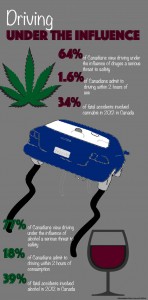Driving High
How the legalization of marijuana will affect impaired driving laws
Kari Pedersen, Publishing Editor 
There is no secret that times are changing in Canada. There is a Liberal government for the first time in a decade, but there is another big change likely to come; the legalization of marijuana.
While this big change follows the lead of several American states, and will likely make for a very different Canada, it affects more than just how much we’ll be spending on potato chips.
There has been a lot of discussion over how being under the influence of marijuana affects the ability to drive. Now that the drug is likely to be legalized, the question is, how will this be handled?
Canadian Centre on Substance abuse (CCSA) suggests that as many people die yearly in drug related crashes (34%) as those who are involved with alcohol related accidents (39%).
According to an article published in 2013 in the National Post, the current process for prosecuting drug-impaired driving is completely dependent on the feelings of the officer. If the officer believes you are impaired, and you fail a field sobriety test, then you can be charged. That field sobriety test can be anything, including reciting the alphabet backwards, which lets be real, most people can’t even do sober.
The article also stated, “Cannabis-impaired drivers tend to drive more slowly and cautiously than drunk drivers, but evidence shows they are also more likely to cause accidents than drug and alcohol-free drivers.”
Currently it is almost impossible to prove that someone is under the influence of marijuana, there is no hand-held device, no breathalyzer and no machine to determine sobriety, nor is there regulations for a blood-cannabis limit. It seems that finding a way to actually prosecute the offense fairly will be the biggest challenge for law-makers and RCMP.
While there is no information on the plan for this so far, it’s expected that the RCMP and city police forces will be searching for ways to prosecute. In the past, possession was enough to get you in some serious trouble, but soon that will be a thing of the past in Canada… it might feel a little bit like Amsterdam in this country.
Another potential issue is urine samples. While this can be the most effective drug testing method for employers, there is no way to determine when the marijuana was consumed, inhaled or used, therefore making it hard to determine if the driver was actually under the influence when the incident would have taken place. Besides, are the police really going to patrol with a urine test on hand?
In other locations where cannabis has been legalized, such as Colorado or Washington State, there has been no recorded increase of impaired driving charges.
While there will probably be controversy on how to tackle impaired driving, the answer won’t likely go back to making marijuana illegal. We don’t ban alcohol because of drunk drivers, so that argument would be a little difficult to hammer home.
While only time will tell what protocols will be put in place, there are sure to be many questions regarding impaired driving in Canada’s new political landscape.




